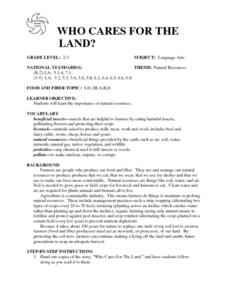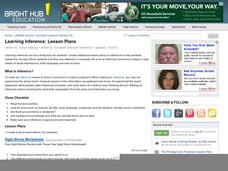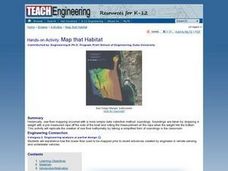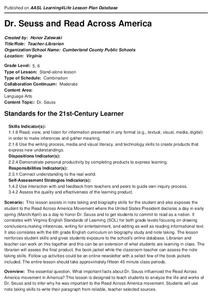Curated OER
Fossil Fuels (Part III), The Geology of Coal
Do not overlook this set of lessons just because your school does not have a data analysis system. There is plenty of material here to administer a complete mini unit on the formation, distribution, and properties of coal. Since it...
Science 4 Inquiry
Journey Through the Spheres of the Earth
Each of the Earth's spheres interacts with the other spheres in predictable ways. Young scientists explore these interactions through a hands-on activity, graphing, and watching a video. They summarize their knowledge in a video or...
Curated OER
Introduction to Primary Sources
Learners explore the usage of primary sources, what they are and how they originate. Artifacts are compared and contrasted as part of this historical inquiry as questions are formulated and conclusions drawn.
Chicago Botanic Garden
Historical Climate Cycles
What better way to make predictions about future weather and climate patterns than with actual climate data from the past? Young climatologists analyze data from 400,000 to 10,000 years ago to determine if climate has changed over time....
Science 4 Inquiry
Deforestation
Young scientists observe deforestation from satellite photos and discuss the importance of forests to the global environment. They then simulate a plot of forest when farmers move into the area over the course of seven years. Finally,...
NTTI
Line 'Em Up!
Coordinate planes and Cartesian graphing systems are the focus of this math lesson. Learners use video, internet activities, and engage in hands-on activities in order to explore coordinate planes. The materials needed for this lesson...
Science 4 Inquiry
Atmospheric Layers
Space diving refers to the act of jumping from outer space and falling through Earth's atmosphere before parachuting to land. Scholars learn about this extreme activity and study the layers of the atmosphere they must conquer in the...
Science 4 Inquiry
Edible Plate Tectonics
Many people think they can't observe plate tectonics, but thanks to GPS, we know that Australia moves at a rate of 2.7 inches per year, North America at 1 inches per year, and the Pacific plate at more than 3 inches per year! Scholars...
Science 4 Inquiry
Frenemies, Bros and Killers: A Lesson in Symbiosis
Animals and plants develop relationships and rely on each other to survive. Pupils learn more about symbiosis through a video, a hands-on matching activity, and a game. They differentiate and describe each type on a written evaluation.
Curated OER
Who Cares for the Land?
A very thorough lesson plan focuses on what plants need to grow and stay healthy. There are excellent reading activities and worksheets included in this fine plan. A terrific way to introduce a unit on plants and their needs.
Curated OER
The Rise and Fall of Joseph McCarthy
Students analyze documents, cartoons, speeches and articles about Joseph McCarthy and his crusade against "Un-American" activities. They guide their research with a worksheet and participate in class discussions about their findings.
Robert F. Kennedy Center for Justice and Human Rights
Juliana Dogbadzi: Slavery/Trafficking
Progress your learners' comprehension of universal human rights by exploring the violation of human trafficking through the experiences of Juliana Dogbadzi. This activity analyzes and discusses very sensistive and graphic issues but is...
Curated OER
Global Economy: A Simple Activity
Students explore the global economy. In this economics lesson, students examine clothing labels in search of the countries the clothing was made in. Students consider the implications of a global economy.
Edgate
Great Grids
Learners use grid boxes as a measurement tool and discover how grids are used for mapmaking and scaling down an area. They begin by attempting to draw a model shape drawn by the teacher by using the gridding process. At the conclusion of...
San Bernardino Co. Supt. of Schools
Was Julius Caesar a Good Leader for Rome?
Learners consider the various perspectives that different groups in Roman society may have had for Julius Caesar, such as Roman soldiers, senators, the working class, and slaves. The primary activity involves a reading of Caesar's...
Curated OER
The Little Ice Age - Understanding Climate and Climate Change
Fourth graders receive data about tree ring records, solar activity, and volcanic eruptions during the Little Ice Age (1350-1850). From this data, they draw conclusions about possible natural causes of climate change
Curated OER
Learning Inference
Making inferences can be a tricky proposition for middle schoolers. In the lesson presented here, pupils practice the skill of drawing a conclusion and making a judgment - which are what making an inference is all about! There are five...
Curated OER
Map that Habitat
Students participate in an activity that replicates the creation of sea floor bathymetry by taking a simplified form of soundings in the classroom. They discuss sea floor mapping technologies, sonar, soundings, and remote sensing,...
Curated OER
Dr. Seuss and Read Across America
What important facts about Dr. Seuss influenced the Read Across America movement...? This is the driving question of a research project that requires scholars to find information about Dr. Seuss' life and work. Class members write a...
Curated OER
Estimation and Your TV Diet
Students develop estimation skills by using real life situations. In this estimation lesson students collect data about their television watching habits. They make hypothesis about the number of hours they watch, how many commercials,...
Curated OER
Education in Colonial New England
Fifth graders examine schooling now and in New England Colonies. In this compare and contrast lesson, 5th graders describe schools of the present to schools of the past. Students also investigate the goals of schooling and the part...
Curated OER
Arriba Amigos!
Students explore how culture effects our world. In this culture lesson, students work in groups to do a web quest. Students gather and analyze information to decide if Mayan ruins should be destroyed to build a shopping center. Students...
Curated OER
Living Conditions in Victorian Houses
Students interpret a painting and draw conclusions about life in 10th century Britain. In this British history lesson plan, students determine what life would have been like for an affluent British family including their heating sources,...
Curated OER
Who Killed the Red Baron?
Students explore, examine and analyze how to apply deductive thinking to evaluate evidence and draw conclusions. They view and critique a handout called "Who Made the Mess?"and a facts sheet on the handout. They divide up into groups and...

























